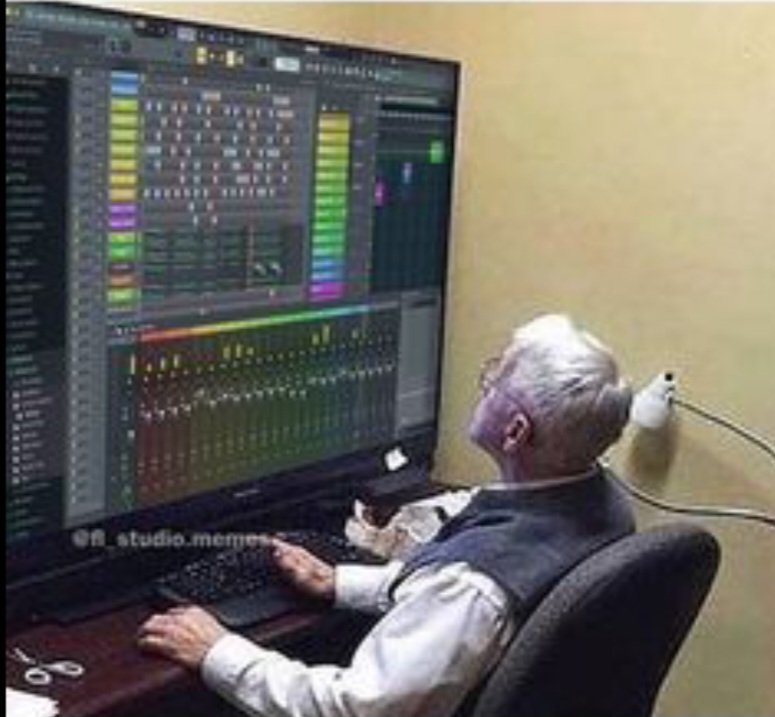-
Posts
1,052 -
Joined
-
Last visited
Everything posted by OutrageProductions
-
So... one interaction with a menu command causes issues and a different operation using a GUI button works. Have you just tried the default Keyboard Shortcut <E> to open the Export dialog? And FWIW; I do scoring similar to your track count or larger, and ALWAYS render the tracks as I work, unfreezing them if further edits are necessary. Keeps the CPU load managable and the playback buffer low.
-
This gentleman has only been in the business about half as long as I have, but still has very interesting advice for the newbies, and the majority of those still struggling to complete that mix that you started 20 years ago. (NOT DAW Specific!)
- 1 reply
-
- 1
-

-
I have a laptop that was ready for everything except the CPU being 6 months too old to make the cut. Installed Win11 (using some Registry mods) and it works perfectly, including updates. The Opensource Shell Menu was updated specifically for Win11 early last year, no issues.
-
I've installed <Open-Shell Menu (currently v4.4.xxx)> on all my studios machines since I left Win7 because the desktop/startmenu/contextmenu/explorer appearance was deeply engrained in my cortex. I have it set to Win7 Classic because I have absolutely hated the Metro look since it's inception. Works perfectly under Win11 pro. https://open-shell.github.io/Open-Shell-Menu/ Clients peek over my shoulder and remark that "you're still running Win7?", and I just have to giggle.
-

how do I know when my activation runs out?
OutrageProductions replied to charles kasler's topic in Cakewalk by BandLab
At any point in the next 28 days. -

How to write a straight line for Mod Wheel on Piano Roll
OutrageProductions replied to carlo's topic in Cakewalk by BandLab
Hold the <Shift> key while drawing. -
-
As one that is past a certain age, I gotta tell you that as a kid in Nebraska, I watched a ball of lightning hit the pole, come down the phone wires into the house and blow the old rotary dial wall-mount Bell telephone to smithereens. So... if you think you're lucky... stick with that story.
-

[Solved] CWBL won't launch, gets stuck on driver
OutrageProductions replied to OPunWide's topic in Cakewalk by BandLab
At this point, maybe a complete clean install of CW is in order. Noel has a sticky about how to do this near the top of the forum categories. -

[Solved] CWBL won't launch, gets stuck on driver
OutrageProductions replied to OPunWide's topic in Cakewalk by BandLab
You can rename the Aud.ini to aud.OLD and it will get rebuilt on next open of the DAW. In the registry under (IIRC) HKLM a section for ASIO (just search the reg for ASIO) and make sure that any "ASIO" named drivers for ASIO4ALL, Realtek, Nvidia HDMI etc. are deleted, reboot & restart CW. Make sure that you have the ASIO drivers for your I/F installed (Presonus or Scarlett) and try again. Interesting that you can only get 44.1SR. My 18 year old Audiobox has always been set at 48k/24b and works perfectly. -

[Solved] CWBL won't launch, gets stuck on driver
OutrageProductions replied to OPunWide's topic in Cakewalk by BandLab
As @57Gregy started on; completely delete anything that is ASIO4ALL related on your system and in the registry. You may need to do the same with the Realtek driver system, but it causes lesser issues in about half of all systems, and may reinstall if it is on your MOBO. The Audiobox should only use the Presonus ASIO drivers that were either supplied or can be DL'd from their support pages. I've used one for 18 years with RT latency as low as 5.3ms and no other issues. Any time you see anything relating to "wave profile" (or derivations thereof,) you are using the Win OS WDM/Wasapi style driver set, which have far inferior response specifications. -

Problem with 8va in Staff View
OutrageProductions replied to David Rubenstein's topic in Cakewalk Sonar
You do realize that the onboard staff module is to proper notation as 'notepad' is to word processing, right? -

Cakewalk Sonar free adding underscore to wav file name
OutrageProductions replied to David Gardner's topic in Cakewalk Sonar
Have you tried to completely quit the DAW before editing the metadata header of the wave file, or is it still running in the background? CW/Sonar have always had a tendency to hold flags on files & folders of a project even after they are closed in the DAW, and only releases the most recent after the entire application is shut down. My other DAWs don't have this issue. -

Synchronization and cache problem
OutrageProductions replied to Leander's topic in Cakewalk by BandLab
Delete Asio4All from your system... it only causes problems. It's not real ASIO, but a wrapper for the Windows WDM driver. This subject has been covered a thousand times in this forum. -

Articulation maps and VSL libraries
OutrageProductions replied to Leander's topic in Cakewalk by BandLab
Because of the inherent delay of the attack in most VSL string & choir libraries, I've developed the habit of entering a negative offset on the whole track, which will also compensate for the articulation map keystrokes, as they get sent with priority within the DAW. You can then continue to edit to the grid or quantize without any other intervention. Delay (IME) can be between 15 and 180 ticks, depending on the library voice timbres & tempo of the composition. Similar delay compensation with EastWest libraries. Interestingly enough, I haven't seen much issue with Spitfire or 8Dio though. -
It is actually a fully balanced switching matrix capable of anything from 2.1 to 22.2.6 Atmos, so no... not really. I use it for 3 stereo pairs, 2 HP cue feeds, and a 7.1.4 playback system. I used to have a Dangerous Designs system, but outgrew it when I went from 5.1 to 7.1.4.
-
I use a Grace Designs m908 and it is absolutely transparent and ultra quiet. Probably not in your budget tho... $7k.
-

Cakewalk/Windows Keeps reverting from 44.1kHz to 48kHz
OutrageProductions replied to Ricky_Wayne_Hunt's question in Q&A
Are you actually using an 'audio interface' or the OS/MOBO built-in audio device? If the latter, then your Windows audio has to be set to the correct SR as well as CW. -

Please help me with this mystery!
OutrageProductions replied to carlo's topic in Cakewalk by BandLab
It's not "automatic"... you had to type the "K" key at some point. The clue when using "clip mute" is that the subject will change to a 'greyed-out' appearance. To avoid that issue you can change the default keybinding to something else that takes more deliberate forethought. -

Refresh Activation message
OutrageProductions replied to Jono J Grant's topic in Cakewalk by BandLab
Also helps to clear the cache in your browser before using the in-app login. If your credentials & cookies are stale, this can be a problem with activation. -

Graphics setting in Sonar Platinum big problems
OutrageProductions replied to Dana Moore's topic in Cakewalk Sonar
You obviously have never read the EULA. You never 'own' any software, you just get granted the convenience of basically leasing it. Unless you write your own applications. Thank you for playing though. -
I doubt this is the proper forum, as is seems highly unlikely to be related to audio I/O and software. You likely have a failing hardware issue on the MOBO. Ram is a good place to start by reseating and R/W tests from a shell.
-

Moving Clips Forward a Specific Number of Measures
OutrageProductions replied to chamlin's topic in Cakewalk Sonar
Open the Inspector; clip properties and you can type in the exact bar/beat starting point. -
Ok folks; to clear up some confusion: as the writer, she held the copyrights to the songs, but her masters were owned by the record label (pretty common industry practice since the 1930's) as a rising artist. The controversy arose when Big Machine was usurped by a hostile takeover from someone who also represented Kanye West, and they enjoined Taylor's use of the "mechanical" rights to her performances on those masters; meaning she could not perform them identically and receive exclusive remuneration, in either live or documentary productions. Which is why she chose to recreate most of those recordings as "Taylor's Versions" and then retain the mechanical rights as well. Very few artists through history have managed to regain ownership of their masters once signed over or their catalog was sold.




